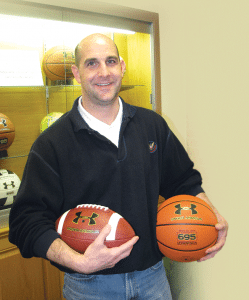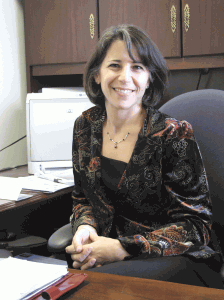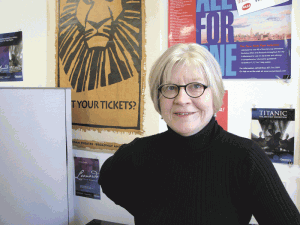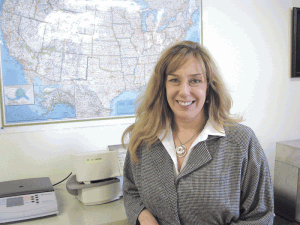
Momentum Building
Enterprise Center Has a New Lease on Life

Dan Touhey, a partner in psi 91, which develops and distributes inflatable products for Under Armor, is one of many new tenants in the Springfield Enterprise Center.
Marla Michel acknowledged that Square One is not exactly the kind of tenant that the creators of the Scibelli Enterprise Center, a business incubator, had in mind when they opened its doors more than a dozen years ago.
The provider of early-childhood-education programs and related services is certainly not a startup (in fact, it’s one of the oldest businesses in Springfield), and it’s not a fledgling outfit looking for advice and technical support on how to get to that proverbial next level — two variations on the desired-tenant profile.
But the institution needed office and operations space after its headquarters and other facilities on Main Street were destroyed in the June 1 tornado, and the Technology Park at Springfield Technical Community College, as well as the so-called SEC, which is part of that complex, provided an attractive, accessible, and affordable option.
“So by taking seven suites in the SEC, Square One has helped forge a classic win-win scenario,” said Michel, the SEC’s director, adding that the company moves into centrally located Class A space not far from where it was before, while the enterprise center gains what she called “much-needed breathing room.”

Marla Michel says Square One’s arrival at the SEC provides the facility with much-needed breathing room to conduct strategic planning.
Companies like psi 91, which moved in just over a year ago.
Started by two former Spalding executives who opted to stay in the region when the corporation left Springfield for Kentucky in 2009, the venture — which takes its name from its function (inflatable products and their unit of measure, pounds per square inch) and its location, off the interstate — develops and distributes products for apparel maker Under Armor. A basketball and football were brought to the market last year, its first in operation, and a volleyball and soccer ball will follow later in 2012 (a rugby ball is also in the works).
There’s also Tickets for Groups, which, as the name suggests, serves groups of 15 or more looking for tickets for everything from Rockettes performances to the current traveling show known as “Bodies: the Exhibition,” touted as a celebration of the human form. Deb Axtell, who started the venture after working as director of group sales for Radio City Music Hall and then Disney Theatricals, and moved into the SEC in 2010, said the King Tut exhibit that was in Discovery Times Square for several months before recently returning to Egypt was a “home run” for the company, and she’s looking for the another show that will fit that description.
Another recent arrival is Barkley Logistics, a third-party logistics company owned by Robin Sauve, that arranges the transportation of shipments between two points, with palletized freight — usually much less than a truckload — comprising much of the business volume. There is a separate division, called My Luggage Valet, which will do the same thing with suitcases, golf clubs, and other items that one may not want to trust to an airline.
The most recent addition, meanwhile, is Sanitas Solutions, a technology partner focused specifically on helping individual physicians and practice groups make the transition to electronic medical records.
To attract more ventures of this type and thus secure long-term sustainability for the SEC, Michel is preparing what amounts to a new strategic plan. As part of that process, the college has hired a consultant, Jim Robbins, a noted expert on business incubators and innovation clusters, to help develop a game plan for the facility as well as implementation processes.
Summing up what Robbins has told the college thus far, Michel said he’s suggested strongly that it undertake revenue-diversification efforts, meaning more income streams — “right now, what we have is the state [through the college] and rent, which is a model that’s not sustainable,” she explained. Also, he has suggested a more regional approach to marketing, greatly increasing the number of incubator tenants, and also providing services outside the walls of the SEC to make it more of a regional resource.
“Once we take location off the table and start shoring up the services an incubator provides, that an enterprise center provides, we can potentially have a much larger economic impact,” she explained, adding that successful incubators around the country have both ‘resident’ and ‘non-resident’ programs, and the SEC will look to emulate those models.
What’s In the Cards?
Like most people in business and education (she’s in both, technically), Michel, who splits her time between the SEC and UMass Amherst, where she serves as executive director for economic development and regional partnerships, has a stack of business cards on her desk. Only, her stack is unlike almost any other.
Her cards are what she calls “three-dimensional.” They fold into small, four-sided cubes, many of which she has sculpted into a multi-level tower. Printed inside the cube are the words ‘business’ and ‘building,’ which, depending on which order they’re arranged, explains both what the SEC is and what it does, said Michel.
And moving forward, it would like to put much more emphasis on the latter half of that equation, and this explains why Square One’s move to the facility is so important.
In recent years, the SEC has suffered from high vacancy rates (near 50% at the low point) that have stemmed from several factors, but mostly the sluggish economy and a lack of aggressive marketing, said Michel. She noted that her initial focus when she arrived 20 months ago, as part of a cooperative agreement between the college and the university, was much more on filling space than the mission of incubating fledgling companies.
Indeed, not long after she took the helm, college administrators gave her the go-ahead to bring in tenants that were non-incubator-related, with the over-arching goal of lessening the financial burden imposed by the center on the college.
She’s added several companies and agencies that fit that description, one of many initiatives designed to help position the center for a stronger, more impactful future when it comes to economic development and all-important job creation.

Deb Axtell, owner of Tickets for Groups, says many SEC incubator tenants leave kicking and screaming — and she intends to do the same.
Meanwhile, she’s also been building what she calls “business clusters” within the center. There are now three of them — Cleantech, IT, and Education, and the hope is that a growing critical mass will help attract other ventures in each category.
With these and other efforts, as well as the relocation of Square One following the tornado, Michel has built up occupancy to near capacity, with tenants falling into four categories:
• Incubator Clients, now totaling six, including psi 91, Tickets for Groups, and Barkley Logistics;
• Anchor Tenants, including the Mass. Small Business Development Center Network, SCORE, and the Small Business Administration;
• SEC Tenants, or non-incubator clients, including Square One, Alliance Medical Gas, CTC Electric, the Achievement Network, and the Veritas Preparatory Charter School; and
• STCC Tenants, or agencies related to the college, such as T.W.O., the workforce-training initiative undertaken in collaboration with Holyoke Community College, and the MassGreen Initiative, a program designed to train people for jobs in green-energy businesses.
The goal moving forward, Michel said, is to gradually increase that number of incubator tenants, but also enable the SEC to have a greater impact on economic development through both resident and non-resident programs aimed at helping ventures survive their first few years in operation and stay in business rather than failing or selling out.
“Our region is lacking services that help companies that are already in business,”she explained. “We have a fair amount of services for those who want to get into business, but when they’re in business, we have to make services more accessible that will teach companies how to grow rather than sell.”
At the moment, she focused on steps ranging from more aggressive marketing of the square footage to simply telling the stories of the people who now have a business address of 1 Federal St., Building 101.
They are all unique, but with several common denominators, including, in many cases, a need and desire to have a place to bring potential clients other than the corner Dunkin Donuts.
A Fortuitous Bounce
Such was the case with Dan Touhey, a former sales executive with Spalding (and BusinessWest 40 Under Forty winner) who opted not to relocate his family when the corporation that owned the sporting-goods maker moved it to Kentucky.
He took his career in a few directions, including a stint in business consulting and an assignment teaching management at UMass, where he met Michel. Later, after he and former Spalding colleague John Frank decided to launch psi 91 together, Touhey asked Michel if the partners could use one of the conference rooms in the SEC to meet with Under Armor executives.
“We had been meeting at Panera Bread or wherever we could grab a cup of coffee, and it just wasn’t working for us to have confidential conversations in that environment,” he told BusinessWest, adding that, to make a long story a little shorter, he and Frank inked their first contract in that conference room and shortly thereafter decided to move into the SEC. Meanwhile, Michel created a new policy whereby any pre-revenue-stage company can use the conference room at the enterprise center.
Just over a year after opening, Touhey and Frank can claim a number of success stories. For example, if one was to look really hard — and past the new (and many would say garish) uniforms worn by the University of Maryland football team last fall — he or she would notice that the team’s offensive unit uses an Under Armor pigskin.
“That’s how it works in college football — the offensive team can decide what ball it wants to use,” said Touhey, adding that several squads that wear Under Armor apparel are now using its footballs and basketballs as well.
“The beauty of our relationship with Under Armor is that we can come under the umbrella of the master brand of that company,” he explained. “And they have a very strong relationship with about 15 colleges and universities; for example, the University of Maryland is an all-Under Armor school, and it used our football last year.
“In basketball, it’s a little different; you play the ball the home team decides to use,” he continued. “If you go Auburn, Texas Tech, Towson University, LaSalle, Lamar, the University of Utah, and others, they’re playing with our basketball.”
The company has added staffing, including other former Spalding employees, and is already tight on space in its 635-square-foot facility. Touhey anticipates that psi 91 will have to move to larger quarters sometime in 2013, an eventuality he’s not looking forward to, because he likes the building, gains from the expertise of Michel and others, and enjoys sharing war stories with other entrepreneurs.
Axtell can relate. She’s not looking to move out either, although she understands that ‘graduation,’ as it’s often called, is part of the incubation process.

Robin Sauve, owner of Barkley Logistics, says one of the main benefits from being an incubator tenant is being able to learn from people who have “been there and done that.”
She eventually moved into a tiny office in East Longmeadow and quickly outgrew that. Thus commenced a search for larger and better quarters that ended at the SEC; she moved in just before Michel arrived.
She told BusinessWest that she’s now up to six employees — four in the SEC, and two who work out of their homes in New York — and is in the process of “taking a snapshot” of her business and writing a new five-year plan.
Meanwhile, Sauve is focused more on crafting a two-year plan for Barkley Logistics, which she created not long after Premiere Logistics, which she served as vice president of business administration before it lost its line of credit, then its reputation, and then most of its customers.
She bought the equipment (mostly hardware and software) used by Premiere, and, seeking a clean break from that venture, started Barkley Logistics, which has been growing steadily since its formation, thanks in large part to support from the panel of advisors assigned to the company as part of its incubation experience.
“There’s an enormous sense of affirmation when you’ve met with people who have been there and done that,” she explained. “The people on my panel, designed to meet my specific needs, have been instrumental.
“As much as I have a general business-management background, I’m not an accountant,” she continued, noting that there is one on her panel who has been helpful with the many financial aspects of operating the venture. “The same with marketing — I’m not an advertising person, so some of the tips I’ve been given on that have been tremendous.
“Just hearing from other people who have run their own business and been through many of the same things I’m going through is a great benefit,” she went on. “It’s comforting to hear them tell me I’m on the right track, and also to know that, if I was doing something wrong, they’d be the first to let me know about it and steer me back in the right direction.”
Room for Improvement
Axtel told BusinessWest that she knows how it’s supposed to work in a business incubator.
“You’re supposed to get the support you need, spunk up, and then you’re thrown out,” she said. “I’ve heard stories that people exit here kicking and screaming, and I hope to be one of those.”
But exit she will — eventually — because, while the SEC is indeed a business building, the focus for the future will be more on what the facility does. And with that in mind, Michel intends to take full advantage of the breathing room that she’s been given.
George O’Brien can be reached at [email protected]





